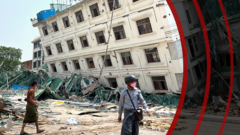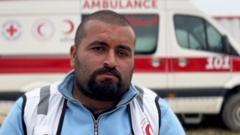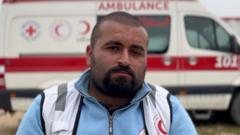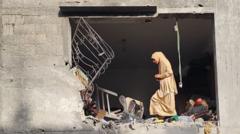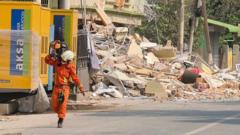One month into Israel's closure of crossings into Gaza, essential services have been severely impacted, leading to widespread suffering among the population. All bakeries supported by the United Nations have ceased operations, markets are devoid of fresh produce, and hospitals are forced to ration crucial medications like painkillers and antibiotics. This blockade marks the longest stretch in Israel's ongoing military actions against Hamas, leaving many families struggling to celebrate the Eid al-Fitr holiday, traditionally marked by joyous feasts.
Gaza Faces Dire Shortages Amid Extended Israeli Blockade
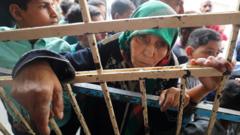
Gaza Faces Dire Shortages Amid Extended Israeli Blockade
As bakeries close and medical supplies dwindle, the humanitarian crisis in Gaza deepens after a month-long blockade.
Gazans, like Um Ali Hamad, express despair, stating, “This was the worst ever Eid for us. We can't eat or drink.” Grocery stores are nearly empty, with vital items like flour, sugar, and milk becoming increasingly scarce. The scarcity has driven prices up dramatically; a 25kg bag of flour now costs as much as 500 shekels ($135) on the black market.
Israeli officials defend the blockade, citing concerns over Hamas controlling resources, while humanitarian organizations warn that the consequences of the blockade are catastrophic, with calls for intervention from global leaders to allow necessary supplies into Gaza. Without access to food, medicine, and other essentials, conditions are quickly deteriorating.
As fighting intensifies with continuous Israeli military operations since March, the toll on healthcare is grave. Many hospitals are at capacity, with reports of medical supplies running dangerously low. The World Health Organization (WHO) and other medical charities have raised alarms about the deteriorating public health situation, urging an end to the blockade to prevent further loss of life.
Efforts for diplomatic resolutions are ongoing, but with the situation remaining critical, many fear that without immediate assistance, hunger and suffering will only worsen in Gaza.
The disparity between official statements from Israel and the experiences of Gazans continues to grow, highlighting a humanitarian crisis exacerbated by ongoing conflict. In this challenging landscape, the need for international support and intervention is more pressing than ever, as those in Gaza face the daunting realities of a blockade and war.
Israeli officials defend the blockade, citing concerns over Hamas controlling resources, while humanitarian organizations warn that the consequences of the blockade are catastrophic, with calls for intervention from global leaders to allow necessary supplies into Gaza. Without access to food, medicine, and other essentials, conditions are quickly deteriorating.
As fighting intensifies with continuous Israeli military operations since March, the toll on healthcare is grave. Many hospitals are at capacity, with reports of medical supplies running dangerously low. The World Health Organization (WHO) and other medical charities have raised alarms about the deteriorating public health situation, urging an end to the blockade to prevent further loss of life.
Efforts for diplomatic resolutions are ongoing, but with the situation remaining critical, many fear that without immediate assistance, hunger and suffering will only worsen in Gaza.
The disparity between official statements from Israel and the experiences of Gazans continues to grow, highlighting a humanitarian crisis exacerbated by ongoing conflict. In this challenging landscape, the need for international support and intervention is more pressing than ever, as those in Gaza face the daunting realities of a blockade and war.

